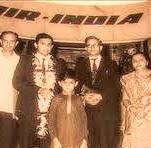TRANSCRIPT
A family that decided that they're going to host me for a month prior to the semester beginning at Northwestern, it was located in a small town called Morris, Illinois. And it was a farm family. And they, a bit through their church group, they heard that the wife, Nancy, that, Robert and Nancy, Bob and Nancy Limbach. So they decided, especially Nancy, since she was active in the church group that it would be a good thing to do in terms of social service, to get a foreign students to come in and live with them in the farm and get to know the American way of life a little bit.
Nancy told me is that “You know, in the US, as a student, you will be required to write several term papers.” I said “Okay, but you know, I've done term papers, when I was a student in India,” she says “No, but here, you're required to submit them typed.” In India, if we had to get typing done, we would give it to a typist, and get it done, but here. So she had a old Underwood typewriter, she gave me that. And she gave me a book to learn typing, the, you know, the finger typing, touch typing. And basically the sentence, which I'm sure you probably heard of “the quick brown fox jumped over the lazy dog,” which has all the letters and how to place the fingers, so that, you know, your mind would get programmed to the keyboard, and then you do not have to look at it, which has been a great help, because even today, I can do that kind of typing without looking at the keyboard. And so that was a great tip from Nancy.
Other things, but it was just mind boggling. I mean, in India, even if we had seen farms, even if we had seen a relatively rich farm, it'd be a few acres, maybe a dozen acres, Bob had two farms each about 1100 acres. It was and then the main products were things like hay and corn, just single crop. In India, for example, getting water into farm would be a challenge, here, Bob told me so he took me on, on his huge tractors and harvester combiners. He had only one person by the way, hired help. So it was he, his family members, his parents also lived down the road, so his father would occasionally help, and this one hired help. And they managed this 2000 acres of farmland so that was amazing, because they had the oldest machines, which of course was just amazing. And then he said, “You know, we have so much water here that three or four feet under the ground and to the entire field there are-” what he called tiles, which are basically perforated ceramic pipes to drain the water away. There's so much water in this land already that instead of irrigation they had to actually drain water away. [laughs]
So these are the kinds of things - but okay, going back again, so on the plane. I was a vegetarian growing up in India. On the plane, I said, “Nikhilesh, you have to make up your mind - are you going to ask at every stop, at every point, 'Is this vegetarian, can I eat it?'” or I decided to make a change. I mean it was, this was like, as soon as I set my foot on the American soil, I'm stopped being a vegetarian. And so the meal that they served me was a hamburger and of course what is one, what is one has heard of hamburger is what you see in pictures? No, sir. On the farm. A hamburger simply means ground beef, which has been brown a little bit with salt and pepper. That's it. No bun. No, no, I mean, that's hamburger in a farm like a farm setting. So imagine a vegetarian trying to eat that food for the first time. After a few days, Bob, for example, could see that I was hardly able to eat the food. Other things were fine, you know the bread and breakfast and dinner.

